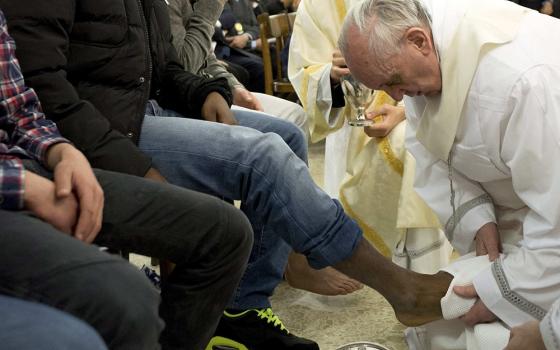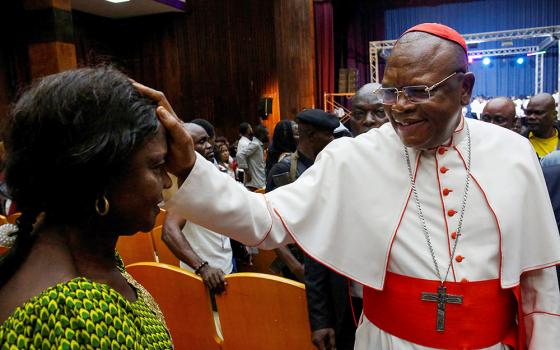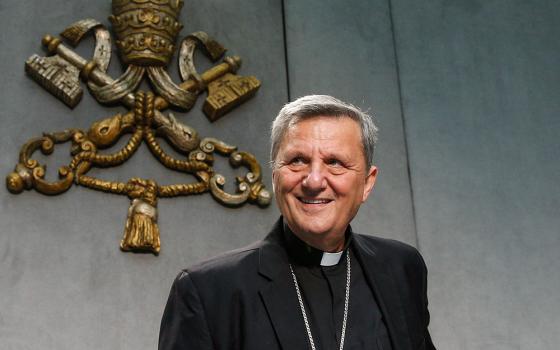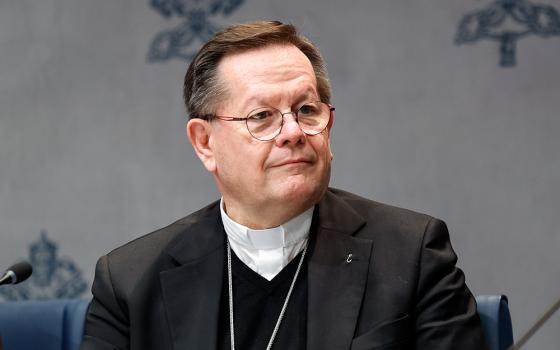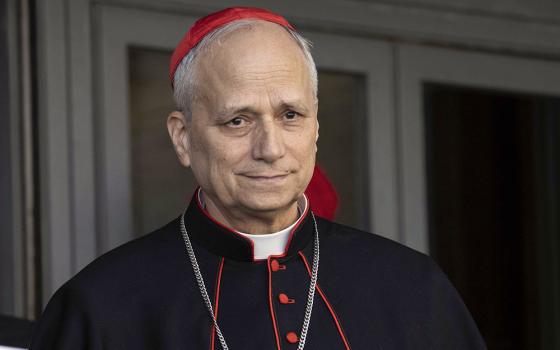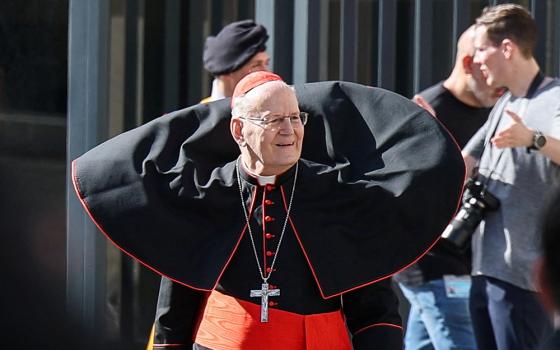
Canadian Cardinal Gérald Lacroix of Quebec attends a press briefing on the Synod of Bishops on synodality at the Vatican Oct. 17, 2024. (CNS/Lola Gomez)
"Vatican power struggle," declares The Guardian. "Civil war," says France 24 international news channel. More than a few commentators have argued that the Francis papacy unleashed an internecine battle inside the Catholic Church.
It is an exaggerated assessment by most fair-minded accounts, but one that still alludes to the dynamics of a church very much at a crossroads with the death of Pope Francis.
If the cardinals are looking for someone to calm turbulent waters, one prelate stands out. Cardinal Gérald Lacroix hails from one of the self-proclaimed most peace-loving countries on Earth and yet also served for nearly a decade in a war zone.
Lacroix, archbishop of Quebec City and primate of Canada, emerged as a major powerbroker during the Francis era. Lacroix, 67, understands the Latin American church from his decade as a missionary in war-torn Colombia and could translate that experience and its lessons to a North American and European audience.
The eldest of nine siblings in a working-class family from Saint-Hilaire-de-Dorset, Quebec, Lacroix moved with his family from Canada to the United States when he was 8 for his father's work as a lumberjack. Lacroix spent his middle and high school years in Manchester, New Hampshire, and then attended the nearby Benedictine-run St. Anselm College. He later returned to Quebec for his theological studies.
In 1975, he entered the Pius X Secular Institute — an organization of men and women who take vows of poverty, chastity and obedience but live in the world, rather than in community together. At Pius X, Lacroix would go on to serve as secretary general of the institute and eventually its director.
After being ordained to the priesthood in 1988, he was soon sent to Colombia, where from 1990 to 2000, he helped open new centers for the institute there.
Advertisement
In a 2017 interview with America magazine reflecting on his Latin American missionary service, he recalled his first meeting with the local bishop of the Popayán Diocese, 350 miles southwest of the capital of Bogotà. Together they looked at a large map of all of the parishes without a priest, including a "very, very poor parish in a war zone, where there were a lot of guerrillas, that had not had a priest in five years."
The missionaries said they would go wherever they were needed and the bishop sent young Fr. Lacroix and his team to the war zone.
Lacroix would celebrate nightly Mass for the parish, which had less than $5 in savings and was devastated by violence from the local drug trade. Over the course of his decade of service there, the community flourished and Lacroix came to be viewed as a capable and trusted negotiator between the locals and the guerillas.
In 2000, he returned to Canada, where he was elected for two terms as the director of the Pius X Secular Institute until Pope Benedict XVI named him auxiliary bishop of Quebec in 2009.
A year later, Quebec's powerful Cardinal Marc Ouellet was brought to Rome to serve as the head of the Vatican's Congregation for Bishops — the highly influential office tasked with advising the pope on bishops' appointments around the world — and in 2011, Lacroix was named as his successor in Quebec.

Retired Pope Benedict XVI greets new Cardinal Gérald Lacroix of Quebec during a consistory at which Pope Francis created 19 new cardinals in St. Peter's Basilica at the Vatican Feb. 22, 2014. (CNS/Paul Haring)
Although he was elevated to serve as primate of Canada by Benedict, Lacroix's resume resembles the profile of a Francis-style bishop: missionary service that prioritized the poor and a commitment to pastoral outreach over political involvement.
"He's a genuine person who does not bring out a knee-jerk reaction in anyone," an influential Quebec Catholic told NCR. The Quebec Catholic recalled Lacroix offering a stark contrast to the culture-warring Ouellet, who always seemed to be battling with secular Quebec, especially when it came to legislation on abortion and gay rights.
In 2013, when the newly elected Francis appeared on the balcony of St. Peter's Square after his election wearing a simple white cassock and asking the people to pray for him, Lacroix thought, "This is my man," he recalled in the America interview.
"I was profoundly touched by his simplicity," Lacroix added.
A few months later, Lacroix was in Rome for Vatican meetings and staying at the Casa Santa Marta guesthouse where Francis resided. The pope came over to him and asked if he might have time to see him while he was in town. The next day, they chatted and began to get to know one another.
One month later, in January 2014, the pope announced he was making Lacroix a cardinal in the first consistory of his young papacy.
Throughout the last decade, Lacroix has been a regular presence on the Roman scene as a member of the Ordinary Council of the Synod and the Vatican's Dicastery for Divine Worship and the Discipline of the Sacraments.
He also hosted Francis during the pope's historic 2022 visit to Canada to apologize for the church's involvement in the country's residential schools that were responsible for the abuse of thousands of Canadian children. In 2023, Lacroix was appointed as a member of Francis' "C9," a council of nine cardinals from around the world that met in Rome quarterly to advise the pope on church governance.
During this time, Lacroix worked to improve his Italian (in addition to his native French and English, as well as Spanish) in order to better navigate the Roman Curia. The French publication La Croix International reported that in the early days of the COVID-19 pandemic, the cardinal had bariatric surgery for weight loss and began to exercise more regularly.

Pope Francis meets with the members of his Council of Cardinals, including Cardinal Gérald Lacroix of Quebec (left), at the Vatican on April 24, 2023. (CNS/Vatican Media)
In the College of Cardinals, Lacroix's name has been frequently repeated as an outsider in the mold of Francis who might who understands how the inside of the church works (and doesn't). He's also seen as someone who might continue in the same style as Francis when it comes to the church's pastoral outreach, but who might be more predictable in his governance style.
His North American background is likely to be viewed suspiciously by some in the church who believe that a Canadian who also holds an American passport has no business being anywhere near the See of Peter, but the fact that he's also well-known not just in Rome and Europe but also in Latin America could lead to a sizable voting bloc in his favor.
Yet for all of those positive factors, his candidacy will be overshadowed by allegations of sexual misconduct.
In early 2024, reports emerged of allegations against Lacroix dating back to 1987 and 1988 by a woman who was 17 at the time, as part of a class-action complaint against the Quebec Archdiocese. Lacroix strenuously denied the allegations but removed himself from the day-to-day governance of the archdiocese while the claims were investigated.
In May 2024, a retired Quebec Superior Court judge said he couldn't find any reliable evidence of misconduct by Lacroix, though he noted that the case was impaired by the fact that the alleged victim refused to participate in the process. In July 2024, the cardinal returned to his duties.
Inside the Vatican the thinking is mixed: There are those who believe that the investigation and effective exoneration only strengthens his profile, as his peers may view him as already vetted. Others believe that since the accuser did not participate in the investigation, he has not received full juridical clearance.
What is for certain is that any potential pope will have his record on clergy abuse strictly scrutinized. Given the deep-rooted nature of the problem, questions will linger over almost any possible candidate — as they have over the past three popes.
This is part of a series on the leading candidates in the 2025 papal election. The National Catholic Reporter's Rome Bureau is made possible in part by the generosity of Joan and Bob McGrath.



